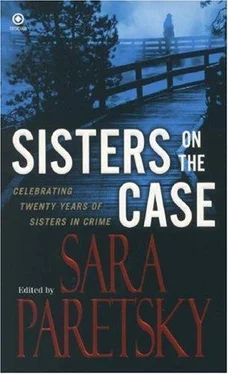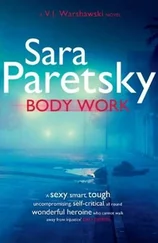As I approached the table I saw them as a stranger might: a tall blond woman with legs going almost up to her neck. A nurse who worked after hours at a free clinic and who had a cloud of dark hair and a dimple in her chin, exactly like our chapel Madonna. And a psychiatrist with a face scarred like a pirate’s. As Dr. Gerstein lifted her drink, her sleeve slid toward her elbow. That was the first time I’d seen the row of numbers tattooed on her arm.
A Family Sunday in the Park: V. I. Warshawski’s First Case by Sara Paretsky
The heat in the attic room was so heavy that not even the flies on the screens had the energy to move. The two children lay on the floor. Sweat rose on their skin, gluing their clothes to the linoleum.
Normally on a hot August Sunday, they’d be at the beach, but Marie Warshawski had decreed that her son must remain close to home today. Normally the cousins would have disregarded such an edict, but today Victoria-Tori to her cousin-was nervous, wanting to hear as much of the grown-up gossip as possible.
She and Boom-Boom-Bernard to his mother- often spent Sundays together: that was when Tori’s mother gave music lessons all afternoon in the minute front room of their South Chicago bungalow; Tori either had to read upstairs, ‘‘ Taci, taci, carissima ’’-or, worse, sit primly in the front room learning from Gabriella’s few good students.
In the winters, Tori followed Boom-Boom to the makeshift ice rinks where he played a rough brand of pickup hockey. No girls allowed, period, which caused a few fights between the cousins-away from the boys, Boom-Boom made Tori help him perfect the slap shot of his idol, Boom-Boom Geoffrion.
In the summers, though, the cousins spent every Sunday together: they pooled their coins to take bus and train up to Wrigley Field, where they would climb up over the backs of the bleachers and sneak into the park without paying. Or they dared each other to jump off the breakwater into Lake Calumet, or rode their bikes past the irate guards at the South Works, playing a complicated hide-and-seek among the mountains of slag.
This Sunday, Tori was too worried about her father to violate Ciocia Marie’s edict. Officer Warshawski had been assigned to Marquette Park: Martin Luther King was leading a march with Al Raby and other Negroes to protest housing segregation in Chicago. There’d been so many marches and riots already this summer, where Tony Warshawski had been away from home for three days, working treble shifts along with every other beat cop on the South Side. Today was going to be worse; he’d told his wife and daughter that before he left for work on Friday.
White people on the South Side had vowed to do everything they could this summer of 1966 to show King and the other agitators he’d brought with him that they should stay in Mississippi or Georgia, where they belonged.
That was how Boom-Boom’s mother put it. She was furious that the cardinal made every priest read a letter to the parish on brotherhood and open housing.
‘‘Our Chicago Negroes always knew their place before these Communists came in to stir them up,’’ she fumed.
Her own parish priest at St. Czeslaw’s read Cardinal Cody’s letter, since he was a good soldier in Christ’s army, but he also preached a thundering sermon, telling his congregation that Christians had a duty to fight Communists and look after their families.
Aunt Marie repeated the gist of Father Gielczowski’sremarks when she dropped in on Gabriella earlier in the week. ‘‘If we don’t stop them in Marquette Park, they’ll be here in South Chicago next. Father Gielczowski says he’s tired of the cardinal sitting in his mansion like God on a throne, not caring about white people in this city. We’re the ones who built these churches, but Cardinal Cody wants to let those ni-’’
‘‘Not that word in my house, Marie,’’ Gabriella had said sharply.
‘‘Oh, you can be as high-and-mighty as you like, Gabriella, but what about us? What about the lives we worked so hard to make here?’’
‘‘Mama Warshawski, she tells me always how hard it is to be Polish in this city in 1920,’’ Gabriella said. ‘‘The Germans were here first, next the Irish, and they want no Poles taking their jobs away. She tells me how they call Papa Warshawski names when he looks for work. And Antoni, he has to do many hard jobs at the police, they are Irish, they aren’t liking Polish people at first. It is always the way, Marie, it is sad, but it is always the way, the ones that come first want to keep out the ones who come second.’’
Marie made a noise like the engine on the truck her brother Tomas drove for Metzger’s Meats; she pursed her lips and leaned over to ask Gabriella how she would feel if her precious Victoria brought home one of them as a husband.
All Gabriella and Marie had in common was the fact that their husbands were brothers. On politics, on child-rearing, even on religion, they were forever in each other’s hair. Maybe especially on religion. Marie had an icon of the Virgin in every room in her house. The Sacred Heart of Jesus inside her front door was a sight that shocked and fascinated Tori-the large red heart, with flames shooting out the top and barbed wire crushed around its throbbing middle (‘‘Those are thorns,’’ Ciocia Marie snapped. ‘‘If your mother cared about your immortal soul, you’d go to catechism like Bernard and learn about Jesus and his crown of thorns.’’)
Gabriella wouldn’t allow such images in her home and she told Victoria it was pagan to worship the heart of your god: ‘‘almost a cannibal, to want to display the heart- barbarica! ’’ Gabriella didn’t think like this because her father was a Jew: after all, her mother and her Aunt Rosa-who like Gabriella had migrated to Chicago from Italy-were Catholics. It was more that Gabriella openly scorned religion.
When Father Gielczowski from St. Czeslaw’s came to visit Gabriella, to demand that she get Victoria baptized to save her daughter from eternal torment, Gabriella told him, ‘‘Religion is responsible for most of the torments people suffer here in this life. If there is a God, he won’t demand a few drops of water on my daughter’s head as proof of her character. She should be honest, she should always work her hardest, do her best work, and when she says, ‘I will do this thing,’ she must do that thing. If she cannot live in such a way, no water will change her.’’
The priest had been furious. He tried to talk to Tony Warshawski about Gabriella.
Peace-loving Tony put up his big hands and backed away. ‘‘I don’t try to come between my wife and my daughter. If you were a married man, Father, you’d know that a mother tiger protecting her young looks tame next to a mother human. No, I’m not lecturing my wife for you.’’
After that, Father Gielczowski glowered at Victoria whenever he saw her on the street. He tried to tell Marie to keep her own son away from the den of unbelievers, but Bernard Warshawski-who was usually as placid as his brother Tony-told the priest not to meddle in his family.
Besides, the sisters-in-law only lived four blocks apart; they needed each other’s help in keeping an eye on two of the most enterprising children in a wild neighborhood. Tony and Bernard suspected, too, that Gabriella and Marie also needed the drama of their arguments. True, Gabriella gave music lessons, Marie worked in the Guild of St. Mary, but both led lives of hard work; they needed excitement, and recounting each other’s monstrous deeds or words gave their lives a running drama.
Right now, the excitement was a little too much for everyone. The mayor, the cardinal, Police Superintendent Wilson, they’d all agreed that Martin Luther King and Al Raby had the right to march in Marquette Park. They’d also agreed that the ensuing violence might be horrific. And Tony Warshawski was one of the officers assigned to the park.
Читать дальше












